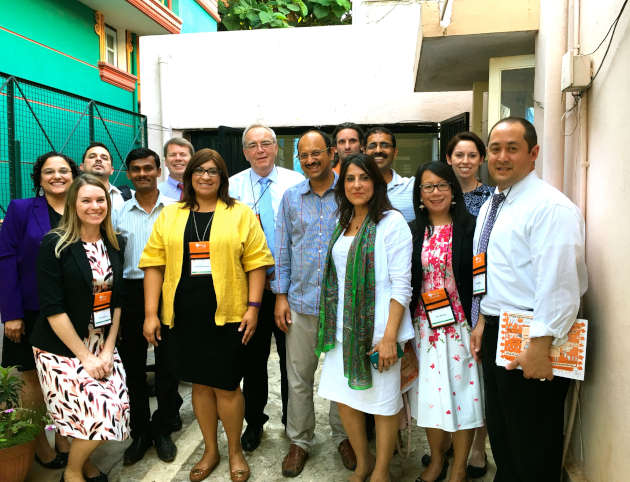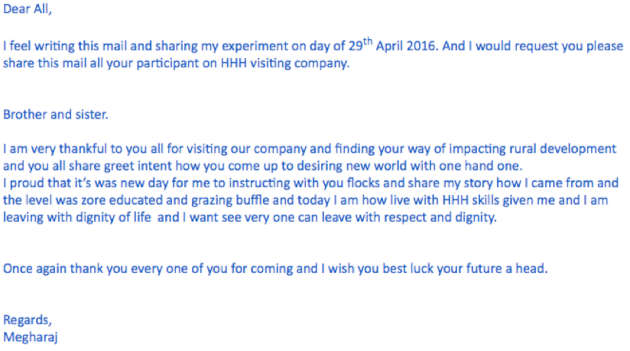
The last company visit for our GLEMBA 2016 international trip to India was to Head Held High Foundation (HHH), a nonprofit organization in Bangalore led by Manada Padaki, co-founder and CEO, and Somayaji Manikantan, chief product officer. The foundation has a mission to eradicate rural poverty in India and contribute to the economic growth that is predicted for the country in the next decade. Our visit with the HHH team was the perfect end to an enlightening and eye-opening week in India. This organization was created by Indian men who, after working across the globe for more than 20 years, decided to take an introspective look. They asked themselves if they wanted to continue on the path to success at a global corporation or if it was time to go back home, apply what they had learned in the business world, put it to good use to educate the younger generation and stop the poverty cycle that has held back the country for so many decades.
Manikantan shared with us some interesting statistics on India’s population and employment activity. We learned that 60 percent of India’s population (of 1.2B) is less than 35 years old. And of that group, 75 percent is considered unemployable due to lack of communication and labor skills. We also learned that only 35 million people in India have a regular job and receive a paycheck on a regular basis. Given these numbers, Padaki and Manikantan believe they can use their more than 20years experience in the technology industry to educate the younger generation and to stop the poverty cycle that has held back the country for so many decades. To do so, they have developed programs that offer services in the areas of education, health and retail through a for-profit organization called HHH Services.
In the area of education, HHH has several programs in place to teach English, communication skills, computer/technology skills, and self-confidence to students in the rural areas and in college to equip them to find jobs and build a better future for them and their communities. Our group was fortunate to meet with Megharaj Mantri, one of the first eight students to participate in the English-immersion program and learned about his journey. Mantri shared with our group that when he joined the program his family was very poor and he didn’t know how to write or read his own language. With the help of the program, he learned how to read, write and speak English, and later on, his own language. The program opened up opportunities for him to finish school and obtain his high school diploma. He now works as a staff member at HHH and wants to pursue a career in human resources and accounting.
In the area of health, HHH Services is developing a program to open 600 centers in the next three years across Tier 2 and Tier 3 cities to educate communities about various health issues as well as provide them with health services at low or no cost. However, HHH is being challenged right now with being able to find qualified staff willing to relocate to the rural areas.
Lastly, in the area of retail, HHH’s strategy is to bridge the gap between the lower class and the middle class by offering goods and services that are available in Tier 1 and Tier 2 cities to communities in the Tiers 3 to 6 cities. For this, HHH is partnering with companies like Amazon and local delivery service companies to deliver the goods to the rural areas. The idea is to create a middleman (delivery service) in a Tier 3 or Tier 4city to deliver goods to Tier 5 or Tier 6 cities and generate jobs. This business model generated a lot of questions from our group to HHH’s team, and even more candid discussion in the bus on our way back to the hotel. One area of concern was the addition of middlemen whose use had the potential to increase costs of goods for Tier 5 and Tier 6 customers who are already in low economic scales.
Although unconventional, HHH’s business model is one of optimism and innovation to allow India and its people to take advantage of the economic and social opportunities available to them in this era. Listening to HHH’s leaders, you cannot avoid feeling inspired to come back home and find ways to make a difference in your community, city and country in everything we do on a daily basis. Like Padaki said to us at the end of our visit: “From time to time, one has to look at where we come from, what we have done, who we have become, and decide whether you want to continue on that path.” This personally resonates with me because I believe that growth happens when we change our way of doing things.
After our visit with HHH, our group received the email below from Megharaj Mantri, one of the eight students to complete the English educational program.

Read the fifth post about the GLEMBA Class of 2016 international study tour to India: GLEMBA Class of 2016 Visit to Safran Engineering Services.






